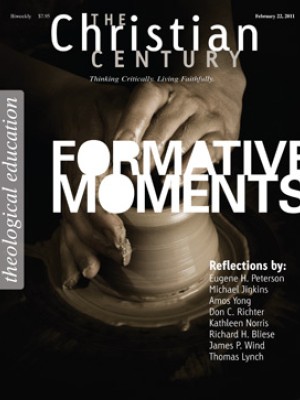Sunday, February 27, 2011: Matthew 6:24-34
At 28, Scott Harrison asked himself, "What would the opposite of my life look like?" As a businessman in New York, he had all the signs of success. But after asking himself this question, he used his considerable gifts in marketing to establish the organization charity: water, which is dedicated to providing safe water for those who don't have access to it.
The use of his natural gifts impresses me. We have within us all that we need to begin to see and think and then act in ways we have not thought possible. Wealth, after all, is a neutral word. It can refer to anything from affluent prosperity to whatever it is that one treasures.
Read our latest issue or browse back issues.
While everyone has a relative or friend who is making good money because he or she is particularly skilled at money management, most of us are just getting by, and some of us are living at the edge of our means. In the past several years that edge has become a high cliff for many people. Many are asking: Is not life more than food, and the body more than clothing? In this one simple question, vastly different worldviews are presented and challenged in an instant. How we understand and respond to this passage in Matthew depends on our context: on whether we're sitting in a new bistro in Brooklyn or waiting in line in Bangladesh for a bag of flour.
The debate within the church and the wider society revolves around justice and social order, and about which comes first. It is not a new debate for Christians—we are still being called to examine how, when and where we respond. Less than half a mile from my seminary office are two churches that address this tension every day. Each congregation is blessed with magnificent buildings that were built in another era. Now they have become centers that offer day care, sports programs, food pantries, shelter and cooperative community health programs, as well as microcredit programs available during the current economic crisis. This innovation takes Jesus' food-and-clothing question seriously.
I grew up with a simple notion: money was a necessary evil, and there was not enough of it. Somewhere along the line, the concept of easy credit was introduced, and my family suddenly had more things: a new washer and dryer, for example, bought on credit and paid for over time. We no longer had to wait months or even years. Instead, when one item was paid for, we could purchase the next thing we needed—a piece of furniture or an item of clothing. The power of Jesus' words speaks to the issues of wealth, anxiety and yes, even to the temptation to indulge in easy credit. Perhaps his words are too simple, too basic for our world's complexity of credit and sophisticated terminology. But I don't think so.
Jesus calls us to a new kind of reality. His intent is less about judging and more about calling us to understand our motives and our own questions in relation to his question. The dilemma for us as Christians is our particular place in the world and the perspective that it gives us. Too much of the time we use the verses from Matthew to erase our thinking about our place and our less than noble motives. We want to block the reality of starvation and lack of shelter and clothing because we are numb of heart and spirit. Some of this numbness is because we have too much; some of it is because we are keenly aware that others do not have enough. Some of our numbness is because we need to hear "Don't worry" in regard to the stresses of our lives.
How are we to have a proper notion of accountability? Jesus brings up this topic of possessions, food and clothing again and again. Why did he give us this dilemma to ponder? Maybe Jesus and his followers were facing the issues of hunger and worry about adequate clothing every day. Most likely this was more than a philosophical or theological discussion.
The tension continues today. The few who have too much and yet are poor in spirit search for meaning that will give them a purposeful life, while too many in the world are hungry and always anxious about finding the next bit of food—they can think about nothing else. In a shrinking world the two realities are quickly pushing and pulling against each other thanks to our global connections.
A lot of the responsibility rests with those who have the resources and the wealth, and especially with those who stake out a claim of serving God. Jesus says that this responsibility is never finished and that this question of wealth must be a primary question for us. It is not answered by replacing angst about malnourished children with judgment, or by tugging comforting phrases out of the text as salve for selfishness. It requires us to ask ourselves again and again—how did this wealth accumulate and is anyone hungry because of it?
Say what you will, Jesus makes one clear call here. Which will we serve—wealth or the Divine Source of all that is and will be? How far do we take this "Is not life more than food, and the body more than clothing?" The words cut through to how well or how poorly we deal with our wealth. If we follow Jesus, these words are vital to how we live our lives and manage our money and resources. We are to reach for what takes precedence in our lives, knowing that we are forgiven and can approach this calling without guilt or shame.





